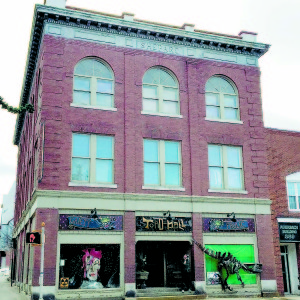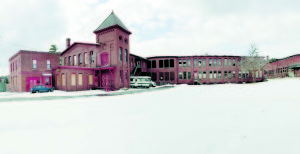
Toad Hall, one of the first properties to move from conception to fruition, currently a studio featuring sculpture made from automotive parts, designed by local artist Joseph Kildune, will soon be home to a new local tavern and brewery, and a co-working center.
By Jenisha Shrestha
Set along the Winnipesaukee River where it merges with the Pemigewasset to form the Merrimack River, Franklin, New Hampshire’s smallest city, is on a path for a sustainable revitalization. As is typical of cities along rivers, Franklin got its economic start by using the power from rivers to run manufacturing processes in its industrial mills that line riverbanks. As the mills began to close in the 1970s, the city entered a prolonged period of dramatic economic decline.
Franklin has been the focus of several design charrettes for revitalizing the downtown over the last eighteen years. Yet these plans and directives have not transitioned beyond planning into implementation. Todd Workman, Executive Director of PermaCityLife, the catalytic organization focused on bringing the Franklin Falls Revitalization Plan to life, believes that the most recent charrette grounded in the principles of permaculture will bring about the transition the city needs.
Having grown up in the nearby town of Gilford, Workman remembers the glory days of Franklin decades ago, yet he rarely spent any time in Franklin. After buying a home on Webster Lake, he walked around the downtown and wondered why the city so rich in heritage and natural resources never returned to its state of prosperity. He imagined a transformed city—a model of a resilient, vibrant, diverse and sustainable community. So, he began connecting with others who shared a similar vision.
For him, this is not just a revitalization project, but a movement. As Workman states, “we are now positioned to carry forward the vision that has been laid out and supported by the community. We have acquired sufficient real estate to reach critical mass and formed partnerships with local government, private investors, educational institutions, and the philanthropic sector to develop these projects.”

CATCH, a nonprofit housing developer based in Concord, plans to renovate the former home of Franklin Light and Power Company and turn it into 45 affordable units featuring a permaculture design and common spaces such as gardens, playgrounds and art studios
New local businesses have occupied the empty storefronts on Central Street. On-going initiatives include a locally-themed restaurant and microbrewery, volunteer-run coffee shop, co-working space, art gallery and music venue, multi-generational mixed-use housing, permaculture-edible landscaping, ecologically-sound storm water management, expanded bike trails and a whitewater park. Future plans under consideration also include: maker space and arts cooperative, performance center, car-reduced downtown with alternative transportation, zero-waste and commercial composting, food hub and farmer’s market, holistic health center, aquaponics and mushroom farming, technology R&D lab, market-rate housing and a hostel with function space and café.
These initiatives would not have become possible without our partners who believe in the vision for Franklin and have become a part of this movement: Credere Environmental Associates, Franklin Business and Industrial Development Corporation, Franklin Parks and Recreation, Franklin Regional Hospital, Franklin Savings Bank, Healthy Eating Active Living, Nobis Engineering, CATCH Neighborhood Housing, Lakes Region Planning Commission, Outdoor New England, The Franklin Studio, and Take Root NH.
Another key collaborator in this movement is Colby-Sawyer College’s Sustainable Learning Initiative along with its new three-year Community-based Sustainability major—an experiential learning opportunity for students to assist the various stakeholders in this movement. (For information about the Colby-Sawyer’s new three-year major and the Sustainable Learning Initiative at Franklin Falls, see the Sustainable Education section on p. 33.)
Positive energy has been generated around saving valuable historic buildings and protecting the natural heritage with the Franklin Falls Historic District to contribute to the economic stability of the greater city of Franklin and surrounding region.
Learn more at: www.permacitylife.com or contact Todd Workman at toddworkman1@gmail.com, (603) 731-4219.
Jenisha Shrestha, Community Development Assistant, PermaCityLife; Campus-Community Liaison for SLI@FF at Colby-Sawyer College.
Late breaking news:
Franklin Savings Bank made a donation of $30,000 to PermaCityLife to assist with our revitalization efforts.

Pictured from l to r: Jordan Urquhart,Toad Hall Tavern, Chef and Owner; Marty Parichand, Outdoor New England; Jenisha Shrestha, PermaCityLife; Colby-Sawyer College Liaison for Sustainable Learning Initiative; Todd Workman, PermaCityLife; Oscar Gala Grano, Take Root Coworking; Jim Aberg, Franklin Business & Industrial Development Corporation; Tim Morrill, PermaCityLife, Dave Savastano, Franklin Savings Bank Vice President; Jo Brown, The Franklin Studio; Mike H. Mullavey, PermaCityLife; Ron Magoon, Franklin Savings Bank President & COO; Joe Kildune, Art Director, PermaCityLife.








Leave a Reply